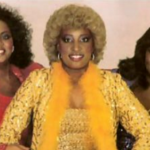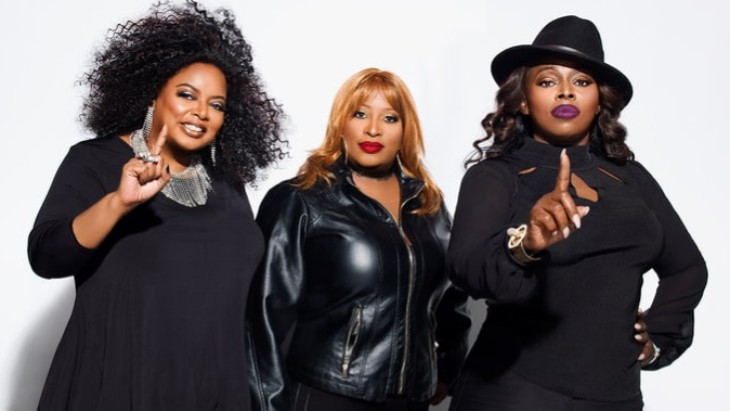Angie Stone & The Sequence Explain How They’re Being Robbed Of Their Place In History

Last summer, women in Rap music were celebrated at the VH1 Hip-Hop Honors, a televised spectacle with Missy Elliott, Queen Latifah, Salt-N-Pepa, Lil’ Kim, and Eve as honorees. Certainly not the only women who have contributed to the culture’s growth, these women being singled out and honored in such a ceremonious way is indeed rare in an industry overwhelmingly dominated by men. The event drew criticism for not acknowledging artists like Sha-Rock, Bahamadia, Foxy Brown, and others, but it would be impossible for a singular telecast to properly recognize the countless women deserving of such regard.
There Is No Hip-Hop Without Women. Every Day Is Ladies First (Video)
Angie Stone is an artist who has taken umbrage with Hip-Hop Honors, though her concern extends far beyond one TV show. Most people familiar with her name recognize her work as an R&B and a Neo-Soul singer, with her talents earning her four number-one albums on the R&B charts and three Grammy nominations. Lesser known – though highly respected – are her contributions in Hip-Hop, a culture in which she had her feet firmly planted as far back as the 1970s. Along with Cheryl “The Pearl” Cook and Gwendolyn “Blondy” Chisolm, Stone founded The Sequence, a Sugar Hill Records outfit whose 1979 single “Funk You Up” landed a permanent place in the annals of Hip-Hop history as being the first of its kind from an all-female crew (and will likely sound familiar to fans of Erykah Badu, who sampled the song on “Love of My Life (Worldwide).”

But despite the venerable achievements, these three women remain largely unrecognized. As Rolling Stone‘s Christopher R. Weingarten puts it, “[t]hey were Rap’s first Southerners, its first hit-making women and possibly the inspiration for ‘Uptown Funk’ – so why can’t they get their props?” Weingarten spoke with Stone, Cook, and Chisolm about their beginnings and their rightful spot at the table, which all three seem to feel they have to continue fighting for, nearly 40 years after making history. “We damn near 60 years old,” says Chisolm. “It’s nothing funny about this. We still have to work. Cheryl lost her grandmama’s house due to not being able to pay her bills.”
“[The term] ‘Gangsta rap’ came out of my mouth. Did you know that?” Cook asks, referring to her lyrics on “And You Know That” (“We’re not Con Funk Shun, we’re not the Gap, we’re the Sugar Hill girls with the gangsta rap“). “We were the only ones talking about ‘gangsta’ in records. It came out of my mouth!” she says. Earning what most would agree is less than a footnote in music history, The Sequence were again, as the ladies tell it, written out of the story told by VH1. “Never once acknowledged, not a spotlight, nothing came in our direction,” says Angie Stone of her experience attending the event. “I just was so embarrassed…[VH1] tried to change history and say a lot of people don’t remember Sequence, [as if we] didn’t make a significant enough contribution, and we were devastated.”
Queen Latifah Honors Hip-Hop’s Women Pioneers In An All-Star Showing Of U.N.I.T.Y. (Video)
Roxanne Shanté, herself a pioneer in Rap music who just so happens to be a woman, recognizes Sequence’s indelible footprints. “A lot of female rappers say they’ve been there since Day One. I’ve been there since the night before. And they were there before that. When it came to hearing them on the radio, they automatically let me know, OK, that’s what I’m supposed to be doing. If it wasn’t for them, there wouldn’t be no me. And if it wasn’t for me, there wouldn’t be none of them,” she tells RS.
It’s one thing to be overlooked, and another entirely to have your work repurposed without any recognition – which is precisely what The Sequence feel Bruno Mars, Mark Ronson and their team did when writing his Record of the Year Grammy winner, “Uptown Funk.” “The Sequence feel that the song – a 14-week chart-topper and 11-time platinum mega-smash – has a bridge that is remarkably similar to the chorus of the their signature track, ‘Funk … you … right on up,’” writes Weingarten. As Stone explains, “Bruno Mars took the lyrics, the cadence and the melodies and then they went and reached over to ‘Apache’ and got ‘Jump on it/Jump on it.’ I’m like, OK, now y’all done did too much. We’re broke over here, OK? We need some money. We need some of that, because we created that!”
Financial woes have affected all three women in different ways, though they all agree the troubles began because Sugar Hill Records owned the group’s publishing for 30 years. Weingarten explains of the group’s plan to take action against Mars and his label, “the rights to ‘Funk You Up’ reverted back to the trio in November 2016, and now the group is raring to ring a few heads of its own. The lawyer representing Sequence tells Rolling Stone that he is in talks with the attorneys that represent Universal Music Publishing, with hopes of resolving the situation amicably – though he says he is prepared to pursue litigation if necessary.”
Elsewhere in the sprawling feature, the three women discuss their South Carolina childhoods, how their relationship with Sugar Hill came to be, and much more.
Go to Source
Author: Amanda Mester
Powered by WPeMatico

